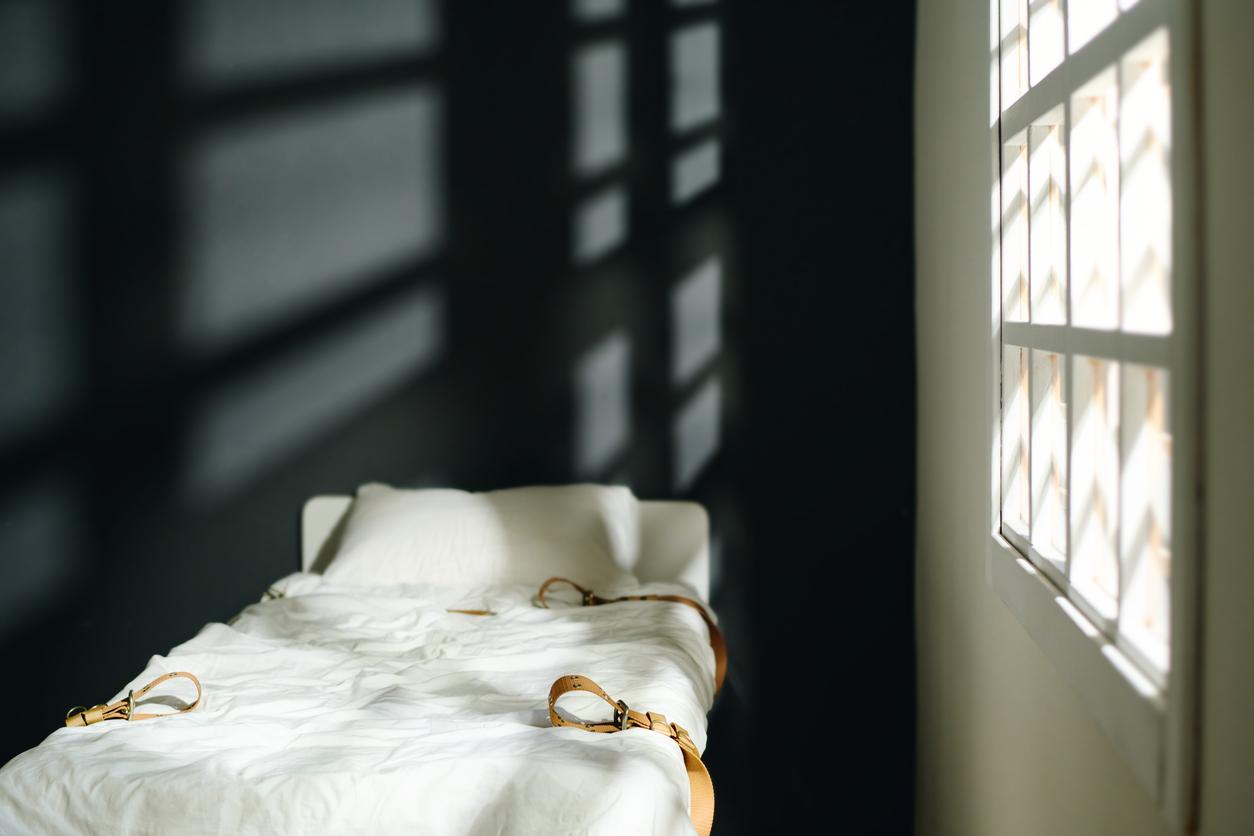Head of the psychiatry department in Seine-Saint-Denis, Dr Fayçal Mouaffak paints a worrying picture of the mental health of the department’s population and the difficulties faced by caregivers.

Dr Fayçal Mouaffak is head of department at the Ville-Evrard psychiatric hospital, in Neuilly-sur-Marne (Seine-Saint-Denis), which serves the municipalities of Stains, La Courneuve and Dugny, “particularly poor and devastated”. In his work Diary of a combat psychiatrist in Seine-Saint-Denispublished in 2024 by Fayard, it discusses the difficult situations that so-called sector psychiatry must face.
Why Doctor: Why do you call yourself a “combat psychiatrist” ?
Dr Faisal Mouaffak: It’s a daily struggle. We must fight against the disease, but also the social difficulties of patients, the inconsistencies of the system, the disaffection of our colleagues, the stigma that our patients and ourselves, caregivers, endure. I feel like I’m living in a series, with an episode every day. The term “support” fits well with the reality on the ground. Psychiatry patients are patients who are rarely cured, who we sometimes relieve and who we always support, according to the adage attributed to Ambroise Paré. Here, in Seine-Saint-Denis (SSD), these are people who combine mental disorders with bad luck, the misfortunes of life.
Mental disorders, social deficiencies… How does this accumulation of sentences manifest itself in your hospital?
First of all, there is speech. We realize to what extent acquiring the verb, the logos, is essential in the future of a person. It’s a valve. Coming from a family that does not speak French, or does not master it well, generates profound educational, material and emotional deficiencies. As a result, some patients do not have the capacity to express their emotions, their discomfort, their demands… We sometimes hear that SSD populations consume all social benefits, while the majority are unable even to make a request, fill out a form, and therefore do not obtain the assistance to which they are entitled. If we doctors don’t make the requests for them, they would never do it!
Every day in the emergency room, we will have at least three patients who arrive agitated, insulting, persecuted, delusional, suffering from hallucinations… There is therefore a huge gap with certain liberal colleagues who practice worldly psychiatry.
This psychiatry “of fight” is opposed, in your opinion, to the “social psychiatry” what can your self-employed colleagues do…
Every day in the emergency room, we will have at least three patients who will arrive agitated, insulting, persecuted, delusional, suffering from hallucinations… Patients who will eventually have to be restrained to prevent them from hurting themselves or others. people. There is therefore a huge gap with certain liberal colleagues who practice mundane psychiatry: they follow comfortable, well-off people, suffering certainly, but with more existential concerns, who do not necessarily need medication. It’s almost psychiatric bobology, it’s not at all comparable with my work.
The psychiatric field is in crisis, suffering from a lack of human and financial resources while mental disorders are increasing. How does this translate into services?
Psychiatry is deserted. Figures show that today there are more people retiring than entering the profession. There are therefore a lot of vacant positions, certain services are running at 25% medical staff. We are unable to recruit or retain caregivers. I point out both the generalized disenchantment with the public service (the value of “serving others” no longer supports a good number of doctors), but also the reform of the internship, with the obligation imposed on interns to complete several passages in university services at the expense of sector services. This should, in the long term, improve the training of doctors, but it was counterproductive: we ultimately see that interns have a negative vision of local psychiatry, considered second category, and prefer either to find a position in a department university, or settle down as a liberal. The rug has been pulled out from under us.
Sector psychiatry is the last resort: we take care of patients that others cannot or do not want to take care of.
Why is sector psychiatry so important?
It is the last resort: we take care of patients that others cannot or do not want to take care of. Sector psychiatry is a pillar, a guarantor of social cohesion in SSD. Without her, the social divide would be so much deeper that the department would sink. The public hospital, in these so-called “lost” territories, embodies the State. Its disappearance is the disappearance of the norm, of the law. We cannot require the population to respect rules and be civic-minded if the hospital, that is to say the right of access to health, is dysfunctional. These territories are only lost because they have been abandoned. I believe that this is precisely the place where doctors must settle down and invest their strength. It is therefore urgent to revive faith, to revalorize confidence in the public hospital – and the public service in general. It is not a money pump, as we sometimes hear, but a matrix for a healthy and coherent society. By practicing good medicine, we change public affairs, therefore we engage in politics.
“We judge the degree of civilization of a society by the way in which it treats its margins, its madmen and its deviants”, according to psychiatrist Lucien Bonnafé. How is the psychiatric hospital (HP) a kind of mirror of society?
It is the thermostat that allows us to measure the degree of functioning or dysfunction of a society. When things go badly, we can anticipate it in psychiatric hospitals, because they are the ones who see the most deprived, the last in line, arriving. Typically, during the Covid period, the first to arrive in HP, for delusions or suicide attempts, were VTC drivers, delivery people of all kinds – both pizza and cannabis. And for good reason, they are often very precarious people, undocumented migrants, who live from day to day, and who only survive because they work. The day a confinement prevents them from moving around, deprives them of the 50 euros daily which allow them to eat and pay the rent, they collapse.
Some patients, whom I am brought to see at the request of the police, even consider the psychiatric environment to be worse than prison.
What were the other repercussions of Covid?
We were buried under a wave of patients showing the most severe clinical presentations. The hospital, already numbed by the reorganization of structures to limit contagion, found itself overwhelmed, with patients strapped to stretchers for several days while waiting for a bed. This confronted us with a huge inconsistency between our values of care and the mistreatment that could be inflicted on patients and their families. As well as our caregivers, because when I ask a nurse to renew the restraint of a patient or to sedate him, I inflict a certain torture on him, a bit like Milgram’s experiment: he complies the first times, but After a while, he questions himself, because it is still up to him to carry out the gesture, to be in contact with the sick and their loved ones. This also explains why hospitals were emptied in the wake of the epidemic.
You also mention a great distrust of patients and those around them regarding HP, with some speaking of “cops in white coats”. How can you explain it, when you are there to help them?
Psychiatry has in its DNA a social defense dimension. Until 1937, it was affiliated with the Ministry of the Interior and embodied more the police function than care. It was only afterwards that it became an organ of Health. We can also cite the influence of films, which depict psychiatrists and HPs in a certain way. This representation of “cops in white coats” evolved with psychoanalysis, with the culture of psychiatric care, but the repressive dimension of psychiatry, oppressive at times, remained in people’s minds, with doctors who are there to watch over the order, capable of locking you up, tying you up, putting you in a coma. Furthermore, hospitalization in psychiatry on your “CV” can penalize you in this society, which remains halfway between individualism and neighborhood, somewhat clannish, community life: the person who becomes psychiatrically ill is all subsequently identified as a “social case”, incapable of being autonomous, of doing anything, not even dealing… Some patients, whom I am brought to see at the request of the police, even consider the psychiatric environment to be worse than the prison. Not because HP is a particularly sinister place, but because the image they keep of it means that, in our society, it is better to be a delinquent in prison than a mentally ill person in HP.
Psychiatry is a blitzkrieg, not a trench war: you have to treat immediately, strike quickly and hard to reduce the patient’s suffering, delusions, hallucinations, and then hand over to a less restrictive service.
What do you think are the priorities for rebuilding the psychiatric environment?
It’s not so much a question of means, but rather of reorganization and state of mind. We need to better manage acute psychiatry, that which surrounds emergencies. Psychiatric emergencies have long been considered the weak link: the least experienced psychiatrists are placed there, the latest arrivals, when the most experienced are needed. Because, emergencies being the point of entry into the hospital, this is where we can act to reduce the congestion of services and offer alternatives to hospitalization, linked with the outpatient service, dispensaries, hospitals by day. Many admissions to the HP are unnecessary: psychiatrists make up to 50% of hospitalizations in emergency departments, whereas other specialties make barely 15%. We should therefore better train caregivers, by creating a new university sector dedicated to emergency psychiatry, as we did for the psychiatry of children, adolescents, the elderly… If we take taking care of patients immediately, we can treat them quickly, free up places, limit the use of coercive measures (restraint, isolation, etc.). Psychiatry is a blitzkrieg, not a trench war: you have to treat immediately, strike quickly and hard to reduce the patient’s suffering, delusions, hallucinations, and then hand over to a service that can support them. in a much less restrictive framework. Hospitalization is not the solution, only the least worst solution. The meaning of the story is the end of the psychiatric hospital, with mentally ill patients being treated in the general hospital for a given time, then returning home, as after surgery.















